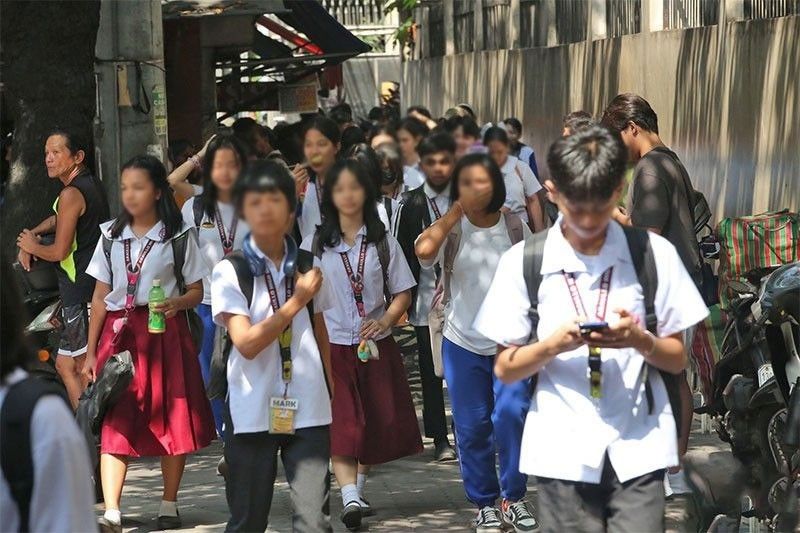Marcos orders skills training integration into K-12 curriculum

MANILA, Philippines — To increase the employability of senior high school (SHS) graduates, President Marcos has ordered the integration of skills training into the K-12 curriculum.
Marcos gave the directive during a meeting with the education sector, led by Vice President and Education Secretary Sara Duterte, at Malacañang yesterday.
The President reiterated his order to the Technical Education and Skills Development Authority (TESDA), Department of Education (DepEd) and Department of Labor and Employment to work closely with industries so that skills and education are aligned with the demand of companies.
At a Palace press briefing, TESDA director general Suharto Mangudadatu stressed that the proposal would not change the K-12 curriculum, but would strengthen the program by adding a practicum component.
Mangudadatu noted the technical-vocational-livelihood or TVL was separated from the academic track under the K-12 program.
“We should provide additional skills for both the academic and TVL track programs. Not because they are in remote areas, they should automatically take the TVL track,” he said.
He added that this would not be an additional task for teachers as schools would decide on the training or skills that would be added in the subjects based on the available resources in particular areas.
“For instance, the school offers ABM (accountancy, business and management) strands, the teacher – who underwent training from TESDA – will allocate the practicum side, which is bookkeeping,” Mangudadatu explained.
“If you are in far-flung areas in the countryside … you can’t teach megatronic programs there because there’s no electricity, but you can teach bookkeeping because you have ballpen, calculator and ledger, so it depends,” he added.
Marcos ordered the creation of a technical working group that will study the proposed embedding of skills development into the DepEd curriculum, according to TESDA deputy director general Rossana Urdaneta.
Urdaneta, who was also at the Palace briefing, cited a study by the Philippine Institute for Development Studies, which showed that only 20 percent of the country’s SHS graduates have landed employment.
Under the proposal, Urdaneta said K-12 graduates would receive both a diploma and a National Competency Skills Certification from TESDA.
The DepEd launched last year the MATATAG curriculum, a revised basic education curriculum under the K-12 program that covers kindergarten up to Grade 10.
The revised curriculum for SHS or Grades 11 and 12 will have a pilot run in School Year 2025-2026, according to Duterte.
DepEd ‘failure’
The DepEd’s “failure” to assess the learning recovery program and curriculum changes based on evidence, not poorly trained teachers, is what clogs learning recovery measures for Filipino students, the Alliance of Concerned Teachers (ACT) said yesterday.
In a statement, the ACT scored the initial assessment of the Second Congressional Commission on Education (EDCOM 2) that the lack of in-depth training that teachers receive to help struggling readers weakens the DepEd’s measures for learning recovery.
The ACT said that had the DepEd conducted a comprehensive, evidence-based learning assessment and a genuine consultation with teachers and other stakeholders, the agency could better address the diverse learning needs of Filipino students amid the learning crisis.
“Teachers are now again frowned at for the ineffectiveness of the DepEd’s reading intervention program despite bearing the burden of its abrupt implementation. EDCOM 2 fails to critically identify where the clog in learning recovery is coming from,” ACT chairman Vladimer Quetua said.
“We have long called for a comprehensive evidence-based assessment of our learners to objectively determine the learning gaps and from where a program of intervention and curriculum revision can be drawn up. It is also crucial that teachers and other education stakeholders are actively involved in the entire process of drafting intervention programs and curricular changes,” Quetua added.
The ACT stressed that the responsibility to deal with declining education quality should not rest solely on teachers, adding that accountability and leadership from the Marcos administration and the DepEd are also needed.
Aside from these, the ACT said the government needs to address the poor working conditions of teachers and the shortage of teachers, school workers, classrooms, desks and other learning facilities and equipment.
“If only the DepEd centers its efforts for learning recovery on the experience and insights of teachers at the grassroots, we can objectively and comprehensively better address the diverse learning needs of our learners and avert the learning crisis,” Quetua said. – Neil Jayson Servallos
- Latest
- Trending































